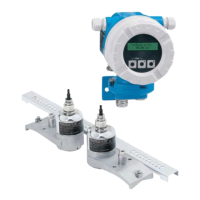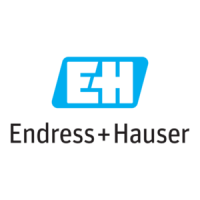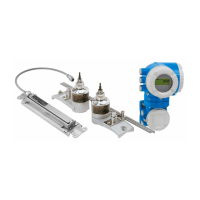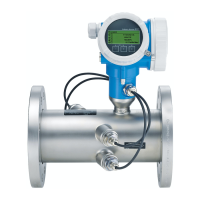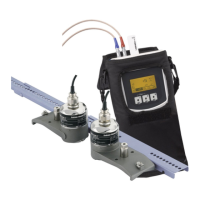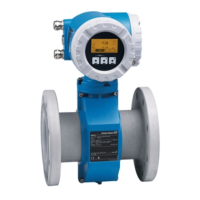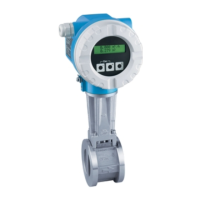Proline Prosonic Flow W 400 HART Mounting procedure
Endress+Hauser 27
Measuring pipe material: glass-fiber reinforced plastic
Nominal diameter [mm (")]
Kinematic viscosity cSt [mm
2
/s]
0 < v ≤ 10 10 < v ≤ 100 100 < v ≤ 1000
Converter frequency (sensor version/number of traverses)
1)
15 to 50 (¹⁄₂ to 2) 5 MHz (C-500 / 2) 5 MHz (C-500 / 2) 5 MHz (C-500 / 2)
> 50 to 80 (2 to 3) 0.3 MHz (C-030 / 2) 0.3 MHz (C-030 / 2) 0.3 MHz (C-030 / 1)
> 80 to 150 (3 to 6) 0.3 MHz (C-030 / 2) 0.3 MHz (C-030 / 1) 0.3 MHz (C-030 / 1)
> 150 to 400 (6 to 16) 0.3 MHz (C-030 / 2) 0.3 MHz (C-030 / 1) –
> 400 to 500 (16 to 20) 0.3 MHz (C-030 / 1) – –
> 500 to 1 000 (20 to 40) 0.3 MHz (C-030 / 1) – –
> 1 000 to 4 000 (40 to 160) 0.3 MHz (C-030 / 1) – –
1) Table shows a typical selection: In critical cases (large pipe diameter, liner, gas or solid inclusions) the optimum sensor type may differ from these
recommendations.
• If clamp-on sensors are used, a 2 traverse-type installation is recommended. This is
the easiest and most convenient type of installation, particularly for measuring
devices whose measuring pipe is difficult to access from one side.
• A 1 traverse installation is recommended for the following installation conditions:
• Certain plastic measuring pipes with a wall thickness of >4 mm (0.16 in)
• Measuring pipes made of composite materials (e.g. glass-fiber reinforced plastic)
• Lined measuring pipes
• Applications with media with high acoustic damping
6.1.3 Environmental and process requirements
Ambient temperature range
Transmitter –40 to +60 °C (–40 to +140 °F)
Readability of the local display –20 to +60 °C (–4 to +140 °F)
The readability of the display may be impaired at temperatures outside
the temperature range.
Sensor DN 15 to 65 (½ to 2½")
–40 to +130 °C (–40 to +266 °F)
DN 50 to 4000 (2 to 160")
• Standard: –20 to +80 °C (–4 to +176 °F)
• Optional: –40 to +130 °C (–40 to +266 °F)
Sensor cable (connection between
transmitter and sensor)
DN 15 to 65 (½ to 2½")
Standard (TPE): –40 to +80 °C (–40 to +176 °F)
DN 50 to 4000 (2 to 160")
• Standard (TPE halogen-free): –40 to +80 °C (–40 to +176 °F)
• Optional (PTFE): –40 to +130 °C (–40 to +266 °F)
In principle, it is permitted to insulate the sensors mounted on the pipe. In the case of
insulated sensors, make sure that the process temperature does not exceed or drop
below the specified cable temperature.
‣
If operating outdoors:
Avoid direct sunlight, particularly in warm climatic regions.

